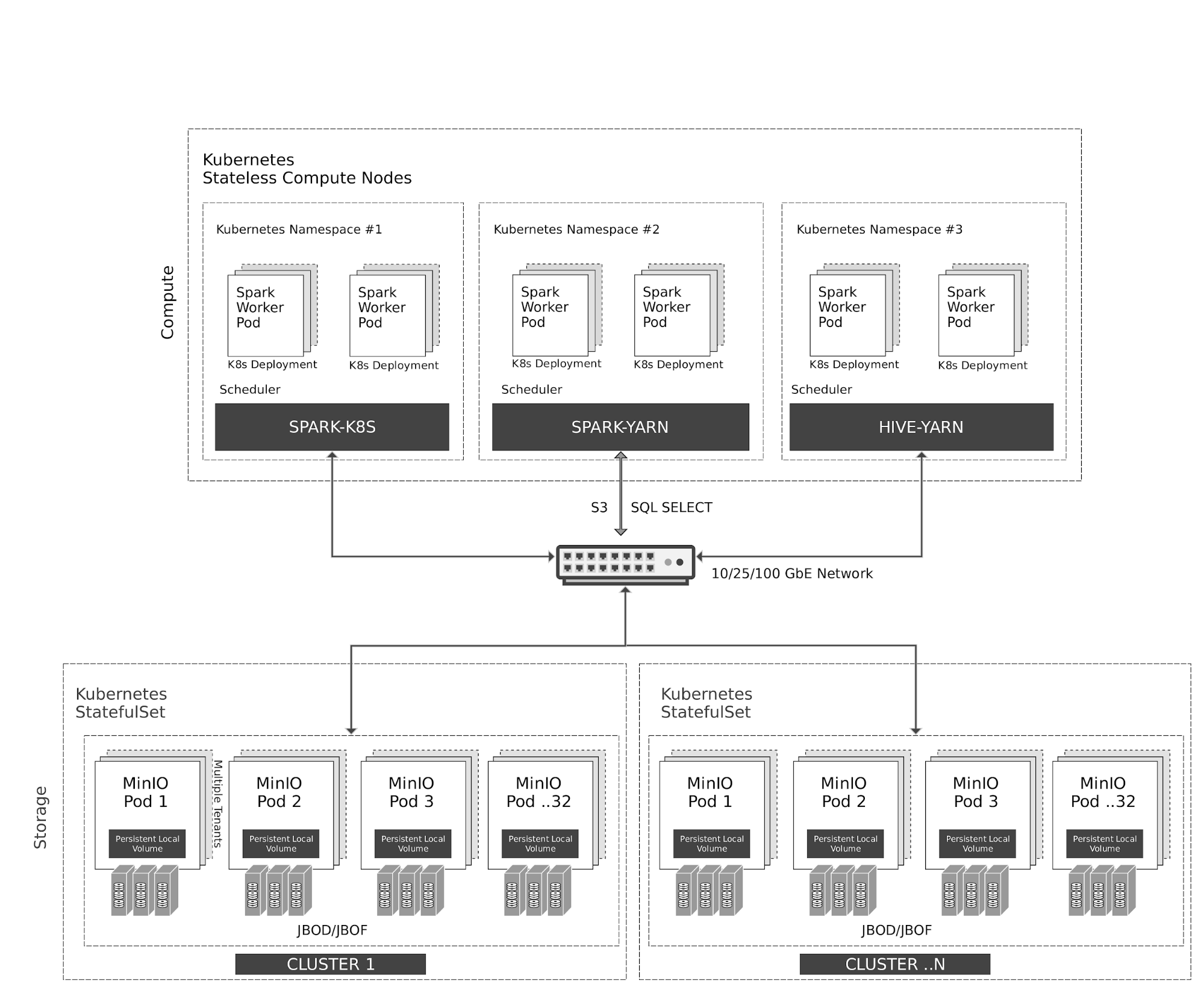- Sort Score
- Result 10 results
- Languages All
Results 1 - 10 of 181 for native (0.06 sec)
-
cmd/signature-v4-parser.go
if aec != ErrNone { return psv, aec } var e error // Save date in native time.Time. preSignV4Values.Date, e = time.Parse(iso8601Format, query.Get(xhttp.AmzDate)) if e != nil { return psv, ErrMalformedPresignedDate } // Save expires in native time.Duration. preSignV4Values.Expires, e = time.ParseDuration(query.Get(xhttp.AmzExpires) + "s") if e != nil {Registered: Sun Nov 03 19:28:11 UTC 2024 - Last Modified: Thu Jan 18 07:03:17 UTC 2024 - 9.4K bytes - Viewed (0) -
docs/orchestration/kubernetes/README.md
MinIO is a high performance distributed object storage server, designed for large-scale private cloud infrastructure. MinIO is designed in a cloud-native manner to scale sustainably in multi-tenant environments. Orchestration platforms like Kubernetes provide perfect cloud-native environment to deploy and scale MinIO. ## MinIO Deployment on Kubernetes There are multiple options to deploy MinIO on Kubernetes:
Registered: Sun Nov 03 19:28:11 UTC 2024 - Last Modified: Thu Sep 29 04:28:45 UTC 2022 - 1.6K bytes - Viewed (0) -
docs/bigdata/README.md
# **Disaggregated HDP Spark and Hive with MinIO** ## **1. Cloud-native Architecture**  Kubernetes manages stateless Spark and Hive containers elastically on the compute nodes. Spark has native scheduler integration with Kubernetes. Hive, for legacy reasons, uses YARN scheduler on top of Kubernetes.
Registered: Sun Nov 03 19:28:11 UTC 2024 - Last Modified: Thu Sep 29 04:28:45 UTC 2022 - 14.7K bytes - Viewed (0) -
cmd/bucket-listobjects-handlers.go
return checkRequestAuthType(ctx, r, action, bucket, name) } } urlValues := r.Form // Extract all the listBucketVersions query params to their native values. prefix, marker, delimiter, maxkeys, encodingType, versionIDMarker, errCode := getListBucketObjectVersionsArgs(urlValues) if errCode != ErrNone { writeErrorResponse(ctx, w, errorCodes.ToAPIErr(errCode), r.URL)
Registered: Sun Nov 03 19:28:11 UTC 2024 - Last Modified: Tue Jun 11 03:13:30 UTC 2024 - 11.4K bytes - Viewed (0) -
docs/metrics/prometheus/README.md
# How to monitor MinIO server with Prometheus? [](https://slack.min.io)
Registered: Sun Nov 03 19:28:11 UTC 2024 - Last Modified: Fri Apr 12 15:49:30 UTC 2024 - 7.1K bytes - Viewed (0) -
docs/kms/IAM.md
it in plaintext (no KMS) or re-encrypts using the KMS. > Is this change backward compatible? Will it break my setup? This change is not backward compatible for all setups. In particular, the native Hashicorp Vault integration - which has been deprecated already - won't be supported anymore. KES is now mandatory if a third-party KMS should be used. Further, since the configuration data is encrypted with the KMS, the KMS
Registered: Sun Nov 03 19:28:11 UTC 2024 - Last Modified: Thu Jan 18 07:03:17 UTC 2024 - 5.3K bytes - Viewed (0) -
docs/distributed/DECOMMISSION.md
│ ID │ Pools │ Capacity │ Status │ │ 1st │ http://minio{1...2}/data{1...4} │ 439 GiB (used) / 561 GiB (total) │ Active │ │ 2nd │ http://minio{3...4}/data{1...4} │ 329 GiB (used) / 421 GiB (total) │ Active │ └─────┴─────────────────────────────────┴──────────────────────────────────┴────────┘ ``` ### Decommissioning status ```Registered: Sun Nov 03 19:28:11 UTC 2024 - Last Modified: Mon Jul 11 14:59:49 UTC 2022 - 8.3K bytes - Viewed (0) -
helm/minio/templates/_helper_create_bucket.txt
echo \"Failed attempts: $ATTEMPTS\" if [ $ATTEMPTS -gt $LIMIT ]; then exit 1 fi sleep 2 # 1 second intervals between attempts $MC_COMMAND STATUS=$? done set -e # reset `e` as active return 0 } # checkBucketExists ($bucket) # Check if the bucket exists, by using the exit code of `mc ls` checkBucketExists() { BUCKET=$1 CMD=$(${MC} stat myminio/$BUCKET >/dev/null 2>&1) return $? }
Registered: Sun Nov 03 19:28:11 UTC 2024 - Last Modified: Fri Jan 12 18:18:57 UTC 2024 - 3.5K bytes - Viewed (0) -
.github/workflows/lock.yml
Registered: Sun Nov 03 19:28:11 UTC 2024 - Last Modified: Sun Jan 30 03:27:43 UTC 2022 - 447 bytes - Viewed (0) -
internal/http/server.go
// GlobalDeploymentID - is sent in the header to all http targets GlobalDeploymentID string ) const ( // DefaultIdleTimeout for idle inactive connections DefaultIdleTimeout = 30 * time.Second // DefaultReadHeaderTimeout for very slow inactive connections DefaultReadHeaderTimeout = 30 * time.Second // DefaultMaxHeaderBytes - default maximum HTTP header size in bytes.
Registered: Sun Nov 03 19:28:11 UTC 2024 - Last Modified: Wed Jun 19 18:42:47 UTC 2024 - 6.1K bytes - Viewed (0)